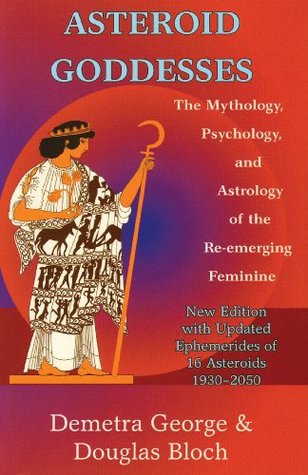Kindle Notes & Highlights
Read between
March 8 - March 8, 2023
The Fear of Abandonment
In a similar fashion, men who are conditioned to receive nurturance exclusively from their mothers or wives fear the emotional deprivation that would arise from the departure of their spouses.
2) The Fear of Betrayal
Many individuals with strong Junos live out her myth by being consumed with the anxiety that their partner, like Jupiter, will be faithless. In some instances, their fears are based on solid evidence.
Astrologically, then, Juno is an indicator of the fear of betrayal that arises from the partner's real or imagined faithlessness.
3) The Fear of Sexuality
Astrologically, Juno is an indicator of the tension and fears that exist concerning the depth of sexual and emotional encounters within relationships.
We have just witnessed that Juno's suffering has the capacity to induce dissatisfaction and conflict in the best intentioned of relationships. There is, however, another side to her nature that brings refinement, fulfillment, and intimacy into that same realm.
Juno's three aspects as Parthenia (maiden), Teleia (bride), and Chera (widow) refer to a natural rhythm that exists within her marital state.
The psychic development of the feminine as consort and wife can be symbolized by the progressive stages of the goddesses Lilith, Juno, and Psyche.
creating new forms of relationships
In her role as wife, Juno symbolizes the principle of relatedness. She represents our capacity for meaningful relationship and the degree of awareness and sensitivity that we bring to another person.
Juno in the signs describes twelve styles of relating and meeting our intimacy needs. If these needs are denied, then Juno signifies the subsequent neurotic interactions that we will experience.
Juno in the houses shows where we are most likely to experience the need to relate and in what area of life experiences we will encounter our most important relationship lessons.
Juno's aspects to the planets describe how the relatedness function may be integrated with oth...
This highlight has been truncated due to consecutive passage length restrictions.
Juno's sign and house position also describes those qualities that we seek in our ideal mate.
Juno in Scorpio people crave emotional and sexual intensity and intimate bonding with the partner.
Chart Example: Sensuality therapist Sylvia Kars has expressed her Juno-Venus conjunction in Scorpio in the ninth house through teaching, lecturing, and demonstrating new methods of sexual rehabilitation. (2)
Juno in Sagittarius individuals require intellectual stimulation with their partner. Consensus on a belief system or a mutually shared vision of the future is required. Rigid insistence on one's own beliefs, religious fanaticism, or inflated expectations of the future can result when a unifying vision is not shared.
Juno in the third house suggests that intellectual and verbal communication are required for fulfillment of relationship needs. The partner often serves as a catalyst for one's own self-understanding. The most important relationship interactions will occur in the area of daily communication and networking with others.
Juno in the twelfth house is significant in the karmic aspect of relationships. Often the partnerships one magnetizes have a destined quality to them. There may seem to be no visible reason for the union, but underlying the surface is an emotional power that one cannot deny. The visible relationship is only the tip of an iceberg whose antecedent causes go back into past lifetimes. Yet, it is these unconscious aspects that surface and dominate the relationship interplay. Sometimes the partner may be disabled or ill, so that one needs to selflessly serve and make amends to them. In other cases
...more
Lilith, portrayed as goddess of the night who tames the wild beasts, represents the principle of repressed anger and conflict resolution.
Eventually, Lilith left Adam, choosing exile and loneliness rather than domination and subjugation. As punishment for rejecting her husband, Lilith became regarded as the personification of feminine evil — a dark demoness who threatened pregnant women, killed children, and seduced and destroyed men. Her image embodied men's worst fears concerning their sexuality and potency.
Joseph, Anthony M. “Chiron: Archetypal Image of Teacher and Healer.” In Ephemeris of Chiron 1890-2000. Toronto, Canada: Phenomena Publications, 1978.
Stein, Zane B. Interpreting Chiron. Lansdale, Pennsylvania: Association for Studying Chiron, 1983.
Daly, Mary. Beyond God the Father: Towards a Philosophy of Women's Liberation. Boston: Beacon Press, 1973.
Ochs, Carol. Behind the Sex of God: Towards a New Consciousness: Transcending Matriachry and Patriarchy. Boston: Beacon Press, 1977.
Patai, Raphael. The Hebrew Goddess. New York: Avon Books, 1978.
Thorsten, Geraldine. God Herself. The Feminine Roots of Astrology. New York: Doubleday and Co., 1980.


